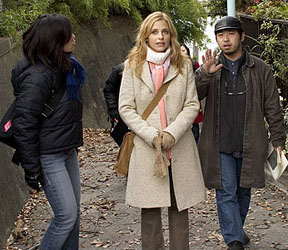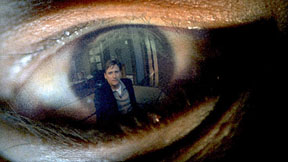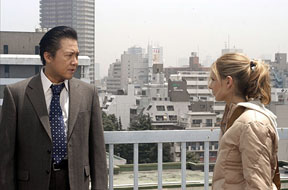 Interviews with foreign language directors are always interesting, because you’re never quite sure if the translator is telling you everything. Not to cite what has now become a cliché, but it really is like Lost in Translation where they speak for minutes, and you get a few seconds recap.
Interviews with foreign language directors are always interesting, because you’re never quite sure if the translator is telling you everything. Not to cite what has now become a cliché, but it really is like Lost in Translation where they speak for minutes, and you get a few seconds recap.
With Takashi Shimizu, he’s been working with this translator since they were on the set, and he’s corrected her in mid-translation, so it sounds like he has some sense of English and how he wants to be represented. A relatively young looking guy, it seems surprising that veteran Sam Raimi reveres him so highly, but Raimi is investing a lot in producing
The Grudge is a remake of
Q: Did you use the same Grudge noise from the original?
Takashi: Yes, my voice. [Croaks for us].
Q: Is the Grudge curse based on a Japanese legend?
Takashi: It’s definitely based on a Japanese culture in Japanese ghost stories. Because when I was little, I really liked reading ghost stories and I was reading a bunch of them. And, you know, in every book the ghosts’ rules and what the story is about is different. I wanted to combine everything to come up with my own world of ghosts and my rules, or that sounds good, or that looks good. I just kind of combined everything and that’s how it all became the Grudge.
Q: Did you have to make any comprises for American audiences?
Takashi: Mood and tone, it’s just something that’s inside of me; it’s just something I believe in. It’s very hard to express, but at the same time, it’s definitely influenced by the films and things that I’ve read in the past. So I thought it was kind of similar among everyone and when it comes to performance, I didn’t want to force any of the actors to do whatever I wanted. But at the same time, there is a definite timing and tone and mode that I carry within myself and sometimes, the actors thought it’s too long to hold that moment, but I just wanted them to trust me for that because sometimes there are times that I just wanted to stay in this one mood and burst into.
Q: Was the translation ever lost to actors?
Interpreter: I was the actual interpreter for the film. For me it was very much fun, it was the best time. He’s talking about me and he’s saying that she was very good, and actually she talks a little more than she is supposed to, meaning she was saying that things he didn’t want them to hear.
 Q: Like?
Q: Like?
Takashi: I don’t remember. Actually, the movie Lost in Translation was happening during The Grudge, so I saw it during the shooting and Sarah got the DVD to watch it, so I was very conscious about the film and very conscious about Sarah understanding what I actually saying. Meaning what if something like Lost in Translation was happening here? I was conscious about that. What I am trying to say is, if I hear English, I can kind of understand the nuance of it. But Sarah doesn’t understand any Japanese so she probably doesn’t get the feeling even, but she was very smart and was able to sense everything so there wasn’t a problem.
Q: Was it weird to make the same movie two years in a row?
Takashi: Very strange. I actually wanted to change as much as I can and bring in something new as much as I can because when I first got this movie to remake, I said no because why do I want to do this again, the same thing, But when Sam asked me to do this, he said, “Bring in the different ghosts tastes to America” and that was such an honor to be asked for. And of course I am a fan of Sam and that’s just a great honor to do what he asked for and that’s why I decided to go with it.
Q: Did you cut anything from the first film you weren’t happy with?
Takashi: Of course, there are things I’m more satisfied in the remake Grudge. But I actually found out that when we were doing the original, there were things we couldn’t do because the low budget and there was no time. But there are still things we can’t do with the money and the time. It was kind of hard for me to find that out, but still this remake Grudge is definitely on a higher level of completion.
Q: Did the American producers give you the freedom to make it your way?
Takashi: Through the process, I have to say, I got more freedom than I expected. But it’s all because of Sam’s support and I really appreciate to Sam for that kind of support. But I still have some difficult time.
Q: What difficulties?
Takashi: Sam wanted me to do the remake of this one because he saw the original. He knew the direction I was going in and he completely trusted me to do that. But the other producers were different, they had so much to say and there were just times that we argued and there was a definite direction I was going for, but the producers just didn’t agree with me. And when that kind of situation happens, Sam came in between and he tried to negotiate both of us. I really appreciate what he did. But you know, those producers, they all have different opinions which is fine and also, I knew that studio producers would have more power than the other producers so I kind of expected this to happen. So while this was happening, I was having a hard time, but after all, once this was all over, I can say it was actually fun.
 Q: Even though Columbia is owned by Sony, a Japanese company?
Q: Even though Columbia is owned by Sony, a Japanese company?
Takashi: That’s separate because it’s not all one company anymore. After all I can say, it was fun, but you know, there was a constant fight between the Sony producers and Sam, Rob, and I. Cause Sam and Rob [Tapert] completely trusted in me for what I can do and what I’ve been doing, this Japanese taste, bringing this Japanese taste to America. But Sony was always thinking about business and they wanted something more typical and wanted something more understandable for the Americans so there was this constant fight, but at the same time, I was able to come up with something between compromises. So now, I can say it was fun.
Q: Were there several different endings tested?
Takashi: There was no argument about the endings, but you know, there were some issues. But also, when I was watching those American DVDs in
Q: Will we see different endings on the DVD?
Takashi: Ending will be the same for the DVD, but because of the MPAA we wanted this to be PG-13, there are so many things we had to cut. So for the DVD, I definitely want to add a director’s cut with all these scarier things that we couldn’t do.
Q: Does a PG-13 restrict you as a filmmaker?
Takashi: Yes, I can say it was strict, but I’m not really a fan of violence and slaughter. Of course, that’s necessary for the horror movie, but I don’t think only those elements, I don’t think these are the only elements that makes a horror movie more scary so in a way, yeah, but not really.
 Q: What R rated themes will be in the DVD?
Q: What R rated themes will be in the DVD?
Takashi: It’s something very small. For instance, the lady ghost is always making that “ahhh” noise; on the DVD, it explains why she makes that noise.
Q: Was it easier working with the original actors from the Japanese version who make appearances here?
Takashi: I wouldn’t say it was easy. Like, the security guard if you remember, he was in the original too. In the original, he is surrounded by other Japanese people. But in The Grudge, he had a scene with KaDee Strickland, who is American. So they had this Japanese/English thing going on so it was different for the security guard, because she’s American, so he had to learn some English and she had to learn some Japanese, that kind of different thing happening so I wouldn’t say it was easy.
Q: Did you use the same locations from the original?
Takashi: Completely different actually, but even Stephen Susco, the writer, saw the original and was so impressed by it and he is basing on it. So whatever he comes up was coming from the original, that’s probably why it was very similar.
Q: What are your future directorial plans?
Takashi: All I have now is horror, but I’m looking for a producer who will let me do a comedy.